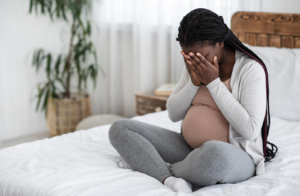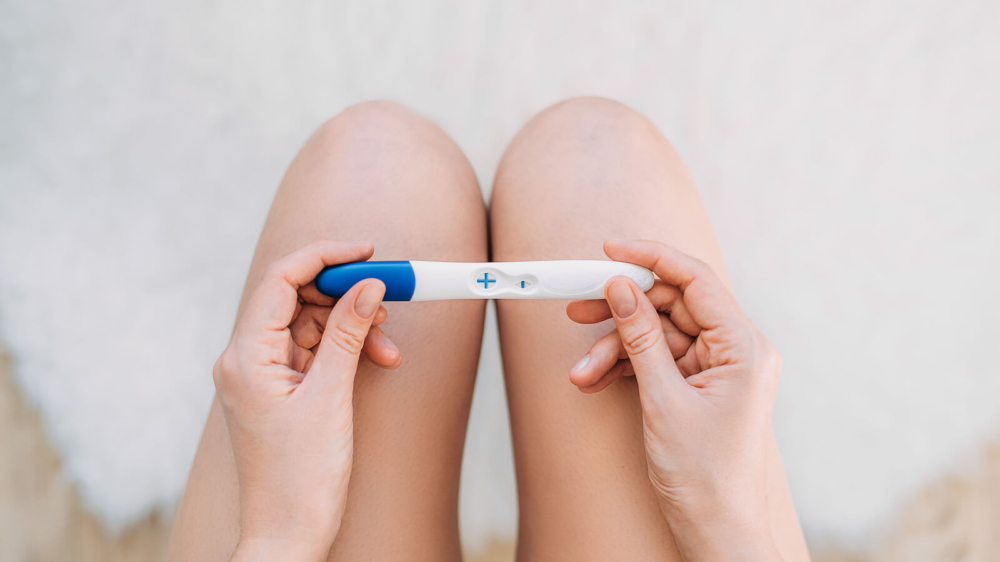No, You’re Not Overreacting: The Truth About Pregnancy After Loss from a Postpartum Therapist in Atlanta, GA
If you’re reading this, chances are you (or someone close to you) is pregnant again after experiencing a loss.
 I know how complicated this space can be. Your joy is now mixed with fear and a desire to make it to the birth as quickly as possible. You may be sharing this joyous news yet feeling paralyzed by sadness, fear, or numbness. You may feel the pressure to do all things that people do early on, like make a baby announcement or start to shop online; however, these activities no longer feel easy or safe. A positive test that doesn’t feel quite as exciting as it once might have. It’s okay to feel all of it.
I know how complicated this space can be. Your joy is now mixed with fear and a desire to make it to the birth as quickly as possible. You may be sharing this joyous news yet feeling paralyzed by sadness, fear, or numbness. You may feel the pressure to do all things that people do early on, like make a baby announcement or start to shop online; however, these activities no longer feel easy or safe. A positive test that doesn’t feel quite as exciting as it once might have. It’s okay to feel all of it.
I’m a therapist who specializes in working with people who are pregnant after loss. This can include miscarriage, stillbirth, termination for medical reasons, or neonatal death. Every story is different, but there is no easy way to navigate loss and pregnancy after loss. That is why I am passionate about supporting parents navigating this rollercoaster of emotions.
While there is no way to prevent the pain and fear, knowing what to expect can be a guiding light. Here are some things I have found to be true during pregnancy after loss.
Grief Doesn’t Hit Pause Just Because You’re Pregnant Again
One of the most common things I hear from clients is this: “I thought once I was pregnant again, I’d feel better.”
And I get why you’d think that. We often hold onto the idea that a new pregnancy might be a “fix” for the pain. And while it’s true that a new pregnancy can bring a sense of purpose or forward motion, it doesn’t erase the grief. In fact, it often brings it to the surface.
Many of my clients feel guilt for still grieving while pregnant or guilt for being happy about this new baby while missing the one they lost. I want to be clear about this: it is okay to feel both. You’re not betraying your grief by feeling hopeful. And you’re not betraying this pregnancy by mourning your loss.
This is not an “either/or” experience. It’s a “both/and.” You can be excited and terrified. Grateful and devastated. It’s all welcome.
Anxiety Is Normal but That Doesn’t Make It Easy
If you’re pregnant after loss, you probably know this flavor of anxiety well: the constant checking for symptoms, the panic at every cramp, the checking after you pee, the dread that creeps in before each ultrasound or OB appointment.
This is trauma showing up. It’s your brain doing what it thinks it needs to do to keep you safe. After all, it learned from experience that something bad can happen. So, it’s now hyper-vigilant, scanning for any possible threat. And while I wish I had a magic wand to take away your fear, I do have tools that can help you carry it differently.
In sessions, we often focus on:
 Grounding techniques (to anchor you in the present when anxiety pulls you into the future)
Grounding techniques (to anchor you in the present when anxiety pulls you into the future)- Building a toolbox of coping skills for medical appointments
- Mindful connection to your body and this pregnancy if that feels safe
- Establishing boundaries with people who may not “get it” (because let’s be honest, well-meaning comments can hurt)
- Naming and validating every single feeling that comes up without judgment
You don’t have to be “zen” to be a good parent. You just need support, space, and a reminder that you’re doing your best in really hard circumstances.
Triggers Are Everywhere and That’s Normal Too
Another thing to prepare for: the world keeps spinning, even when you’re navigating all of this. You may find yourself triggered by baby showers, pregnancy announcements, hospital visits, even commercials or social media posts.
You may find that people stop asking how you’re really doing, because now that you’re pregnant again, they assume you’re “better.”
You’re allowed to set limits. You don’t have to go to the baby shower. You can unfollow people on Instagram for now. You can say, “Actually, this pregnancy has been really tough emotionally,” when someone makes a well-meaning but dismissive comment like “At least you’re pregnant again!”
This is your experience. You get to protect your mental health.
The Invisible Work of Loving Another Baby
One of the tenderest parts of pregnancy after loss is bonding with this new baby. And I want to be real with you: it might not happen right away. Some people feel connected early on. Others don’t feel safe to attach until later, or until they’re holding the baby in their arms. Some even feel like they’re betraying their lost child by loving another. This is all completely normal, and it is important to have a safe space such as therapy to process any guilt or shame that may be coming up during your pregnancy.
Finding Support That Feels Right for You
If you’re navigating a pregnancy after loss, one of the best things you can do is not do it alone. Whether that means working with a therapist, joining a support group, or just having a safe person who gets it.
Sometimes even your partner may not fully understand how you feel. They’re grieving too, but everyone does it differently. Talking openly about your fears, triggers, and hopes can be hard but healing. Couples therapy can help if you feel like you’re on different emotional planets.
And if therapy isn’t accessible right now, there are wonderful communities online such as Support International that offers free online groups.
A Note on Milestones
You may find yourself holding your breath until certain dates such as the gestational age of your loss, the anatomy scan, the third trimester, and delivery.
 Here’s what I tell my clients: you’re allowed to take it one day at a time. You don’t have to rush to the finish line. Some days you’ll feel more confident. Others you’ll spiral. That doesn’t mean you’re failing, it means you’re human. I help them identify moments when their anxiety may peak and how to “walk alongside it.” When you walk alongside your anxiety, you are acknowledging it but not letting it consume you. That can feel empowering.
Here’s what I tell my clients: you’re allowed to take it one day at a time. You don’t have to rush to the finish line. Some days you’ll feel more confident. Others you’ll spiral. That doesn’t mean you’re failing, it means you’re human. I help them identify moments when their anxiety may peak and how to “walk alongside it.” When you walk alongside your anxiety, you are acknowledging it but not letting it consume you. That can feel empowering.
You Are Not Alone. Start Postpartum Therapy in Atlanta, GA
If you’ve read this far, I want to leave you with this: there is no “right” way to feel during a pregnancy after loss. If you’re looking for a space to talk through all of it — the fear, the grief, the guilt, the hope — therapy can help. It’s not about “fixing” you. You’re not broken. It’s about having someone sit beside you in the storm, remind you you’re not alone, and help you find moments of steadiness along the way. Our team of caring therapists would be happy to provide support. You can start your therapy journey with Informed Therapy Group by following these simple steps:
- Reach out through our contact page, call (404) 444-8974 or email info@informedtherapy.com to get started.
- Meet with a caring therapist
- Start finding support for your grief while preparing for the road ahead.
Other Services Offered with Informed Therapy Group
The team at Informed Therapy Group take a multifaceted approach to mental health. In addition to postpartum therapy, we are happy to offer neurodivergent therapy in Atlanta, GA, anxiety therapy, depression therapy, grief and loss counseling, and therapy for stress management. In addition, we also offer in couples counseling, and pregnancy counseling. Explore our About Us page, visit our blog, or read our FAQs to learn more about how we can help. When you’re ready to reach out, we encourage you to call (404) 444-8974 or email us at admin@informedtherapy.com.


